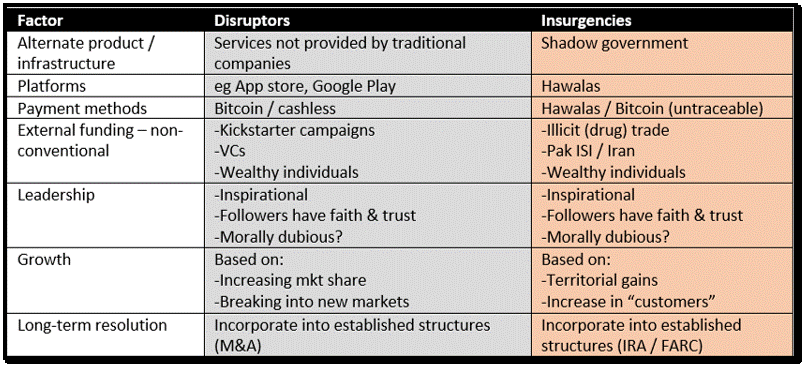Discussion about the influence of disruptors is popular. CNN’s 2017 list of 50 identifies 31 unicorns[1], a total of $44 billion in VC, and a market value of $239 billion.
But this post isn’t just about disruptors. It is the parallels between disruptors and insurgencies that interests me – and the So What? Although the Afghanistan campaign was launched under the auspices of Article 5, counter-insurgency has been the driving force for NATO’s raison d’etre since 9/11 (although rumblings from the near east in the short-medium term, and the potential of the Far East in the long term have provided some recent temperance).
I am not comparing Uber, AirBnB, Netflix etc with insurgents! But their methodologies are similar. Insurgencies are predicated on offering citizens of the space that they operate in alternate products – this could be in the form of shadow governance, moral leadership, and justice. These alternate products would have no value if they weren’t needed – in the parts of Afghanistan that the government does not control many locals appreciate the ability of an organisation to come and settle disputes (a judiciary), deal with criminals (a police force), provide education (madrasses), and so on.
Disruptors do the same thing – although often they often do so in Blue Ocean space. Uber’s success was driven by frustration with cartel-esque pre-GPS practices of taxi-drivers; AirBnB’s by providing a personal experience that is so often absent from chain hotels (how many hotels have generic centralised websites which facelessly manage all their bookings?); Udacity’s by enabling the attainment of relatively cheap and recognised education qualifications to support increasing demands by employers for skills that are being offered with dubious quality with opaque pricing arrangements by universities.
I find real parallels in the way that disruptors and insurgents are funded. Both have embraced alternate methodologies that sit outside of traditional means. Both use cryptocurrencies – disruptors are often spurred on by the innovative and ground-breaking nature of their founders to enhance their appeal to the type of customer that it wishes to attract; insurgents relish in the difficulty in tracing it. Both groups avoid cash. Insurgents have a further method of money movement, making use of traditional hawalas that sit outside of government scrutiny.
External funding is similarly unconventional. Many disruptors have developed from Kickstarter campaigns and venture capitalist investors; insurgents are often funded by the illicit drug trade. Both types of organisations receive income from wealthy individuals. Insurgents receive additional funding from supportive states; some disruptors from established companies. In all cases these are far removed from the traditional methods of raising capital for a company. But in the same way that insurgents often eventually come to the negotiating table and accept some traditional ways of doing business, many disruptors do eventually decide to float, or get acquired by established businesses. By this time, however, the disruption has been caused.
Further similarities can be found in the leadership of both groups. The leaders of both elements are often inspirational and held in high reverence by followers, whilst at the same time their behaviour can be morally questionable (see Uber…). Both types of group seek to increase their customer base, often through well-concentrated and planned public relations exercises. Disruptors want to increase their market share, whilst insurgents will attempt to gain everything from popular support to more territory.
In sum the parallels are clear, and in Part 2 I will look at what militaries can learn from how businesses have dealt with this challenge.

[1] A start-up company with a value of over $1 billion (Investopedia).
